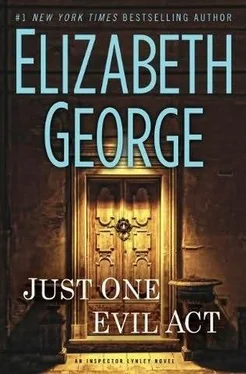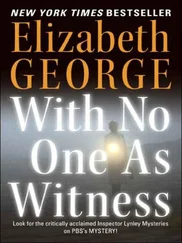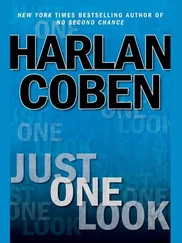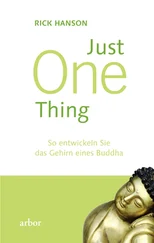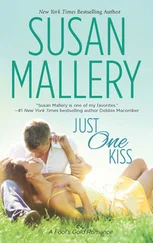Upman waited just long enough to suggest that his wife would be paying later for her remarks. Then he turned on his heel and left her to swing open the door and allow them entrance. She led the way into a living room, beautifully decorated but without a sign of personal taste other than that of an interior designer. It looked out upon the back garden of the property, and through its French windows, landscaping lights illuminated paths, a fountain, statuary, dormant flowerbeds, and lawn.
In a corner of the room, a Christmas tree stood. It was yet to be decorated, but the fact that they’d interrupted Ruth-Jane Upman in the midst of handling this holiday chore was evident by a string of lights that had been spread on the floor and a box of ornaments sitting on the hearth of a fireplace.
She offered neither one of them a seat. Their stay was, obviously, not meant to be long. She said, “Have you reason to believe my daughter is dead?” No emotion accompanied this question.
Barbara said, “You’ve not heard from her?”
“Of course not. When she took up with this man”—a cursory glance at Azhar—“we ended our relationship with her. She would not see reason. So we would not see her.” She addressed Azhar then with, “Has she left you at last? Well, really, what else would you actually expect?”
“She has left me before,” Azhar said with some dignity. “We have come to see you because it is my earnest wish to—”
“Has she indeed? Has she left you once before? And yet you didn’t dash over here then—whenever it was—to enquire about her. What brings you now?”
“She has my daughter.”
“Which one would that be?” And then, reading something upon Azhar’s face, Ruth-Jane Upman added, “Yes, Mr. Azhar. We know all about you. When it comes to you, Humphrey did the homework and I graded every one of the papers.”
Barbara said impatiently, “Angelina has taken Hadiyyah with her. I expect you know which one of Azhar’s daughters Hadiyyah is.”
“I assume she’s the . . . one . . . Angelina gave birth to.”
“She’s also the one ,” Barbara said, “who probably misses her dad.”
“Be that as it may, I have no interest in her. Nor have I interest in Angelina. Nor have I, frankly, interest in you. Neither her father nor I have any idea where she is, where she might be going, or where she might end up in the future. Is there anything else? Because I’d like to finish decorating my Christmas tree, if you don’t mind.”
“Has she contacted you?”
“I believe I just said—”
“What you said,” Barbara interrupted, “was that you have no idea where she is, where she’s going, or where she might end up. What you didn’t say was whether you’ve spoken to her. During which conversation, we can both assume, she wouldn’t necessarily have to say where she is.”
Ruth-Jane said nothing to this. Barbara thought, Bingo. But what she also thought was that there was no way in hell that Angelina Upman’s mother was going to give them a thing to go on. She might have spoken to Angelina at some point; she might have been the recipient of a telephone message, a text message, a letter, a card, or whatever else of the “I’ve left him, Mum” variety. But, no matter the case, she wasn’t about to admit that to Barbara.
“Azhar wants to know where his daughter is,” Barbara told Angelina’s mother quietly. “You can understand that, can’t you?”
She seemed completely indifferent. “Whether I understand or not makes no difference to anything. My answer remains the same. I’ve had no personal contact with Angelina.”
Barbara brought her card from the pocket of her jacket. She held it out to the woman. She said, “I’d like you to ring me if you hear from her. It being Christmastime, you may well do.”
“You might like me to do that,” Ruth-Jane Upman said. “But granting your wishes isn’t one of my powers.”
Barbara laid her card on a table nearby. She said, “You think about that, Mrs. Upman.”
Azhar looked as if he wanted to make some sort of appeal, but Barbara tilted her head towards the doorway. There was no point to further discussion with the woman. She might let them know if she heard from Angelina. She might not do so. It was not in their hands to bend her will to theirs.
They headed for the door. In the corridor leading to it, the walls bore pictures, three of them black-and-white shots of a spontaneous nature. Barbara paused to look at them. They were all, she saw, of the same subjects: two girls. In one they were at the seaside building a sand castle, in another they rode a merry-go-round with one of them on the high pony and the other on a low one, in the last they stood holding out carrots to a mare and her adorable foal. What was interesting was not the expert nature of the photographs, however. Nor was it notable how they’d been framed and mounted. What would cause any viewer to stop and give the pictures a thorough study was the girls themselves.
They would be Angelina and Bathsheba, Barbara reckoned. She wondered why no one had ever mentioned that the girls were perfectly identical twins.
ISLINGTON
LONDON
It seemed to Barbara that there was a final possibility to be explored. She did so on her lunch hour the very next day, and she didn’t tell Azhar she was going to do it. He was dispirited enough. To him, writing out a cheque to pay Dwayne Doughty was the same as saying, “Case closed.” To her, perhaps the case was closed in Doughty’s eyes, but till she’d worked every possible angle that she could think of, she couldn’t accept that Hadiyyah and her mother were permanently gone.
Barbara had been keeping her nose remarkably clean at New Scotland Yard. There was nothing she could do about the wreck she’d made of her hair, but she’d decided it behooved her to slither onto the better side of Acting Detective Superintendent Ardery, so her manner of dress had been for days if not impeccable then at least not worthy of note. She’d worn tights, and she’d polished her brogues. At Ardery’s command, she’d even begun working on a case with DI John Stewart without complaint, although most of the time what she wanted to do was crush out a burning fag on his face. As for fags, she’d refrained from smoking in the Met stairwells as well. She was on the border of making herself ill with her own wonderfulness, so she knew it was time to do a little something on the side.
She went to WARD. She had the home address of Angelina’s sister, but she reckoned Bathsheba would greet her appearance on the doorstep in a fashion not dissimilar from her parents. Going at her in her own workplace at least would give Barbara the advantage of surprise.
WARD was on Liverpool Road, conveniently close to the Business Design Centre. It was one of those achingly trendy establishments, so uncrowded with its products as to make Barbara wonder if it was, perhaps, a front for money laundering instead of what it purported to be, which was a showroom for the furniture designed by its eponymous owner. The woman herself was within. Barbara had ascertained as much with a phone call and an appointment made earlier in the day. She knew better than to make it known to Bathsheba Ward that her putative customer was actually a police officer. Instead, she offered her an airy explanation along the lines of “I’ve heard so much about you.”
In advance she’d done a bit of homework on the woman. She’d managed this while ostensibly entering a report into HOLMES for DI Stewart, who’d decided he’d play out his personal dislike of her by giving her an assignment which should have gone to a civilian typist. Instead of grousing, arguing, or banging about the incident room making her displeasure known, she’d said, “Right. Will do, sir,” and she’d offered him what passed for a congenial smile when his eyes narrowed at her quick cooperation. Thus, she’d had time to delve into Bathsheba Ward née Upman, so when she walked into the showroom she knew that Bathsheba had eschewed university for design school after having failed to make it as a professional model because of her height and after also having failed to find her place in the cutthroat world of fashion design. With furniture, however, she’d been wildly successful: awards aplenty along with photos of the pieces which had won them. The crowning glory of a young career had been the acquisition of one of her pieces by the V&A and another by the Museum of London. These two events were especially memorialised in Bathsheba’s office by plaques and exquisitely preserved articles from glossy magazines.
Читать дальше
